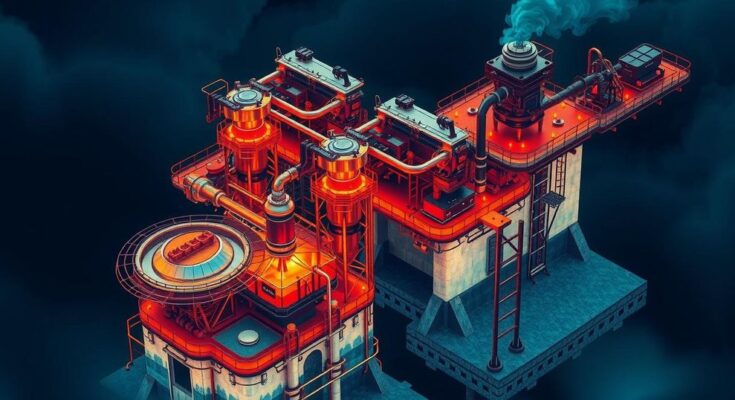Turkey is working to increase oil and natural gas production in Syria as part of its reconstruction efforts. The country plans to address Syria’s electricity needs, with Turkish Energy Minister Bayraktar highlighting the importance of utilizing hydrocarbons for Syria’s recovery. This development follows significant changes in Syria’s political landscape and aims to facilitate the return of refugees currently in Turkey.
Turkey has expressed its intent to augment oil and natural gas production in Syria, a move that signifies Ankara’s deeper engagement in the reconstruction efforts of the war-affected nation. Turkish Energy Minister, Alparslan Bayraktar, stated that authorities are exploring methods to address Syria’s significant electricity shortfalls following over a decade of infrastructural damage due to conflict. Furthermore, Bayraktar asserted that plans are in place to utilize crude oil and natural gas as resources to aid Syria’s recovery, with an emphasis on detailing potential contributions to counterparts in this venture.
This initiative underscores Turkey’s ambition to play a pivotal role in Syria’s rehabilitation after the recent upheaval led by the Islamist group Hayat Tahrir al-Sham (HTS), which has close ties to the opposition against President Bashar al-Assad’s regime and marks an end to a lengthy civil war that initiated in 2011. Prior to the conflict, Syria’s hydrocarbon production was minimal, and the current production capacity has dwindled significantly, estimated to be around 30,000 barrels per day, which is merely 5% of its former output levels.
The situation is further complicated by the international community’s designation of HTS as a terrorist organization. Recent discussions among Group of Seven leaders suggested support for a new Syrian government, with indications that Turkey may reconsider HTS’s classification. In light of this development, President Recep Tayyip Erdogan has been working to maintain amicable relations with various factions of Syria’s interim government, potentially facilitating the reconstruction efforts and enabling the return of approximately three million Syrian refugees currently residing in Turkey.
Prospective long-term collaboration between Turkey and Syria could also involve the establishment of new oil and gas pipelines, linking Syria’s resources to Turkish export terminals, thereby enhancing the economic stability of the region and promoting further development.
Turkey is currently aiming to enhance its influence and involvement in the reconstruction of Syria, which has faced significant devastation during a prolonged civil conflict. Oil and natural gas production have been severely impacted, resulting in diminished output and a need for infrastructural rehabilitation. Turkey’s efforts are not only intended to boost Syrian energy resources but also to foster friendly relations with emerging political entities within Syria, amid shifting territorial and governance dynamics.
In conclusion, Turkey is proactively positioning itself to stimulate oil and natural gas production in Syria, aligning its interests with the reconstruction of the war-scarred nation. By proposing to assist with energy needs and exploring new infrastructure projects, Turkey seeks to establish a significant role in Syria’s recovery process. This initiative reflects broader geopolitical shifts and the need for humanitarian engagement amidst ongoing challenges in the region.
Original Source: www.worldoil.com




